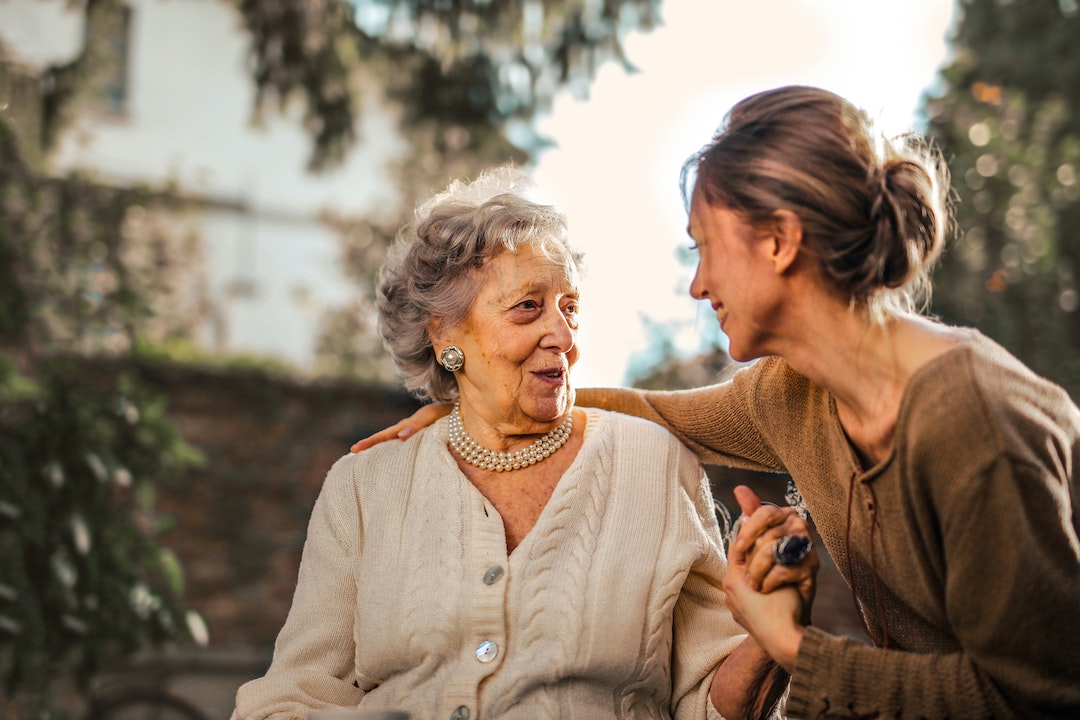In the Eastern Townships region of Québec, the non-profit organization Hameau des Cultures seeks to provide eldercare to people living with Alzheimer’s and other forms of dementia. Focusing on the human rather than the disease, its compassionate model of care is a breath of fresh air in a sector riddled with problems.
It has been over a year since the novel coronavirus spread across the world and customary rituals once taken for granted—social and religious gatherings, hugs, kisses and handshakes—became affronts to public health concerns. Few have been hit as hard by the pandemic as people living in long-term care and, more precisely, seniors with dementia. Not only do they have an elevated risk of contracting and dying from Covid-19, public-health restrictions have limited outings, activities and, even more critically, family visits and human interaction—bright little kernels of happiness in an extremely isolated life.
The pandemic shone a light on the crisis in eldercare. The issues plaguing our already dysfunctional system—inhumane conditions, physical and verbal abuse, neglect, overworked and underpaid staff—suddenly magnified in the race to contain the new virus.
In his new book, Neglected No More: the urgent need to improve the lives of Canada’s elders in the wake of a pandemic, Globe and Mail health columnist André Picard reveals the full extent of the quandary.
“What other people in society do we send off to live in these prisonlike facilities just because they’re old?” he told the Tyee.
“I think we have to ask ourselves this really profound question about what kind of excuses do we make to ourselves as a society that this is acceptable.”
Picard identifies the current situation as an opportunity to use Covid as a “launching pad to talk about these larger issues.”
And he is optimistic we are at the juncture of a turning point for eldercare.
A client-focused approach to eldercare
Dr. Paule Royer, president of Hameau des Cultures, an “innovative living space for people suffering from Alzheimer’s and their loved ones” according to its website, has an idea of the direction eldercare should take. “As I go, I realize that I am more of a social-medicine doctor. I want to diversify the approaches, and lean towards a non-pharmaceutical approach,” Royer told Radio-Canada.

The idea of social medicine is quite simple: seeing patients as partners, it seeks to understand how health, disease and social conditions are tied together. In a gist, the health of the entire population is a matter of social concern.
Embracing this philosophy, Dr. Royer and her life partner, Richard Carpentier, began working on Hameau des Cultures (which means Cultural Hamlets).
“I don’t think we should house seniors in institutional care. The more they are confined, the faster they lose their autonomy and develop behavioural problems, the more they are medicated, the more they are at risk of falling,” Royer explains.
Inspired by the Maison Carpe Diem in Trois-Rivières, Hameau des Cultures seeks to offer a dignified way of living for its residents, in a beautiful space in proximity to nature. Striving to offer a stimulating living environment that prolongs the autonomy of residents while assisting them through the palliative and terminal stages of their disease, the non-profit affordable housing project for people living with Alzheimer’s will have 30 units and 6 beds reserved for family caregivers. Having secured most of the needed funds, the housing project will see the day in 2023.
The Community Housing Transformation Centre has awarded $40,000 to support this unique project, which is located in Magog, Québec, close to the Vermont border.
True transformation
The project is transformative since it would respond to a specific need for people living with Alzheimer’s disease. There is no suitable residence in the region that offers an interesting living environment to this clientele. The grant will lighten the burden of the volunteers who have supported the project from the start, by investing time and money.
The awarded grant will jumpstard preliminary construction plans and be used to complete the documentation needed to access financing through Canada Mortgage and Housing Corporation and the Société d’habitation du Québec.
Hameau des Cultures will document their model of services for seniors living with Alzheimer’s in collaboration with the Centre de recherche sur le vieillissement and a researcher from Université Laval—helping to promote the project’s results in relation to both housing and health.
“Our project will transform the residential environment so that it adapts to the person rather than the other way around,” adds Royer.
Exactly the kind of transformative approach the Centre was created to serve.



